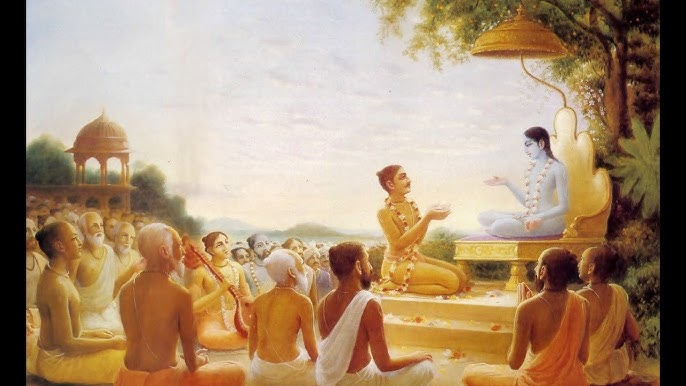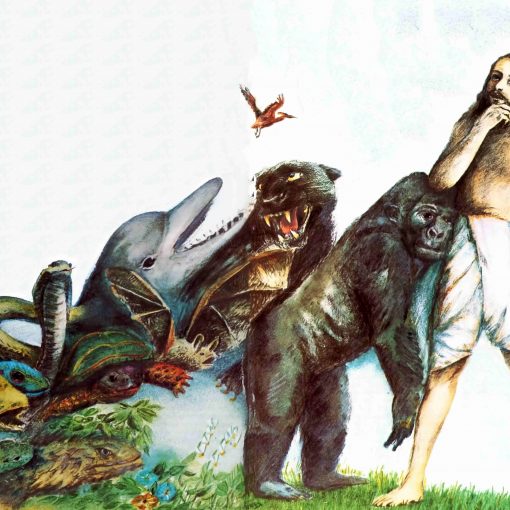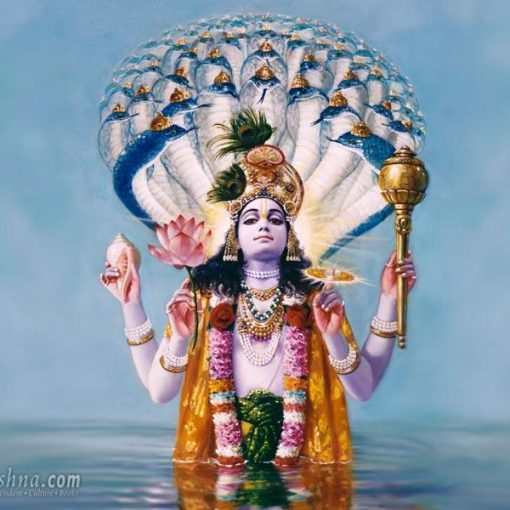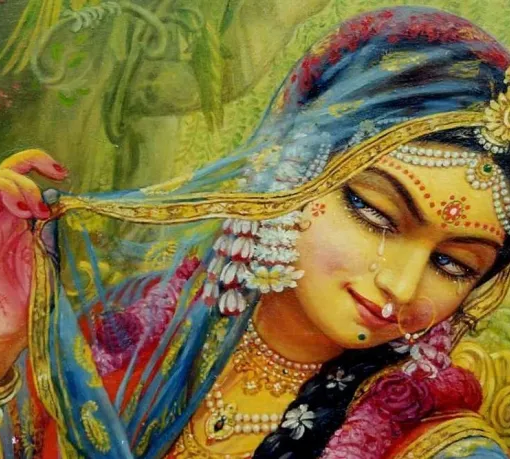The Cosmic Stage is Set
Picture this: a forest so sacred that its very air hums with ancient wisdom—Naimisharanya. In this hallowed ground, 88,000 sages gather with one purpose: to find the solution to the increasing chaos of Kali Yuga, the age of quarrel, deceit, and spiritual degradation. The trees seem to whisper prayers into the wind as these sages, radiant with the light of their tapasya (austerities), sit in a grand assembly. Their faces are aglow with wisdom, but beneath that wisdom is a deep concern. Time is running out.
As their voices settle into silence, the leader of the assembly, Saunaka Rishi, rises. His gaze sweeps over the gathering of great souls, who represent the very best of spiritual knowledge and practice. They have come together not just for intellectual debate or academic curiosity, but for something far greater: they seek the solution to save humanity from the downward spiral of the age of Kali.
Saunaka Rishi speaks, his voice both urgent and solemn: “The world is sinking deeper into the mire of materialism and ignorance. We are standing on the edge of an era where righteousness will be all but forgotten, and spiritual practices will dwindle. The dharma, which once upheld society like the strong roots of a tree, is now eroding. What is the ultimate good for humanity in these times?”
The question hangs in the air. What is the highest purpose of life? This isn’t just a question—it’s the question of all questions, one that transcends time, culture, and circumstance. The sages are aware of the gravity of their inquiry, and they know that the answer must go beyond ritualistic practices or moral codes. It must address the heart of existence itself.
Enter Suta Goswami: The Keeper of Divine Stories
At this pivotal moment, all eyes turn to Suta Goswami, a sage known for his deep understanding of spiritual matters. But more than that, Suta holds the keys to something far more valuable—the timeless stories of the Supreme Lord Krishna. He is a vessel of divine knowledge, having heard from great souls and seen the workings of the universe with his own eyes.
Suta stands, a humble smile on his face, ready to impart the highest wisdom. But before he can speak, Saunaka Rishi frames the question more specifically: “Suta Goswami, you have traveled far and wide, and you have heard the most sacred teachings. You’ve studied the Vedas, the Puranas, the Itihasas like the Mahabharata, and the Upanishads. You’ve listened to the words of great sages and saints. Now, we ask you—what is the essence of all that knowledge? What is the supreme truth that will benefit all of humanity?”
This is a loaded question. In a world drowning in information, they are asking for the one truth that will lead them—and future generations—to salvation. The room falls silent, the sages eager for an answer. And not just any answer—they seek the ultimate truth that transcends life and death.
Suta’s Heartfelt Response
Suta’s heart is brimming with devotion as he prepares to reveal the secret to overcoming the darkness of Kali Yuga. His voice is clear, yet filled with the weight of the profound truth he’s about to share. He begins, “The question you ask is indeed the most important one. In this age of Kali, there is but one way to transcend the suffering, confusion, and chaos: devotion to the Supreme Lord, Sri Krishna.”
A wave of realization washes over the sages. Suta has just pointed them toward the ultimate solution—bhakti, the path of loving devotion to Krishna. Why Krishna? Because, as Suta explains, Krishna is not merely a historical figure or a divine incarnation, but the Supreme Personality of Godhead, the source of all that is.
But Suta doesn’t just stop with an abstract concept of devotion. He explains that in Kali Yuga, the prescribed path for liberation is remarkably simple: chanting the holy names of Krishna. Unlike previous ages, where the pursuit of self-realization required rigorous austerities or complex rituals, in Kali Yuga, the divine is so merciful that just by chanting His names, one can achieve liberation.
Imagine that—something as simple as chanting Krishna’s names is powerful enough to cut through lifetimes of accumulated karma, desires, and attachments. It’s a message that feels like a breath of fresh air in the dense spiritual confusion of this age.
Why Krishna? Why Now?
Suta goes on to explain why Krishna, in particular, is the most merciful and accessible aspect of divinity in this dark age. While many forms of the Divine exist, it is Krishna who descends to the material world out of pure love for His devotees, performing playful, enchanting pastimes that captivate the hearts of all who hear them. His leelas (divine pastimes) are not just stories; they are windows into the transcendent, meant to draw souls back to Him.
Suta’s explanation resonates deeply with the sages. They understand that Krishna’s names are not ordinary words; they are transcendental sound vibrations. Simply by hearing and chanting these names, one’s heart can be cleansed of all impurities. Imagine the transformative power—just by uttering the sound “Krishna,” we connect directly with the Supreme Lord, beyond the constraints of time and space.
But How Did the Bhagavatam Come to Be?
At this point, Suta begins to unravel the mystical origins of the Srimad Bhagavatam itself. The sages are riveted as Suta narrates the story of Vyasa, the great compiler of the Vedic texts. Despite his monumental accomplishments—compiling the Vedas, writing the Mahabharata, and composing many of the Puranas—Vyasa felt an inexplicable dissatisfaction in his heart.
What could be missing? Vyasa, a sage of unparalleled wisdom, had given the world the most comprehensive body of knowledge ever written. Yet, something still troubled him. The sages listen closely as Suta recounts how Vyasa’s dilemma was solved by none other than Narada Muni, the celestial sage who travels through all worlds spreading the glories of the Lord.
Narada’s advice to Vyasa was simple yet profound: “O Vyasa, despite your incredible achievements, you have not sufficiently glorified the Supreme Lord, Krishna. You have spoken of dharma, artha, kama, and moksha, but you have not focused on the purest form of spirituality—bhakti, loving devotion to Krishna.”
With this revelation, Vyasa sat in deep meditation and, by divine inspiration, composed the Srimad Bhagavatam—a text that focuses entirely on Krishna’s pastimes, qualities, and teachings. It is the essence of all Vedic literature, a text so powerful that hearing it can liberate even the most fallen soul from the cycle of birth and death.
The Power of Hearing
Suta’s eyes glow as he conveys the incredible power of simply hearing the Bhagavatam. “By hearing the Bhagavatam,” he declares, “one can cleanse the heart of all impurities, all desires for material enjoyment, and attain the highest state of love for God.”
This is no ordinary scripture. The Srimad Bhagavatam is the embodiment of Krishna’s presence in the form of words. Each verse, each story, each lesson is a direct manifestation of the Supreme Lord’s grace. And the sages know that to hear this sacred text is to embark on the path to liberation.
A Call to Action: Devotion is the Key
As Suta concludes his teachings, the sages sit in awe. The answer to their question has been revealed in all its simplicity and profundity: devotion to Krishna is the ultimate path to liberation. Through hearing, chanting, and remembering Krishna’s name and pastimes, anyone—regardless of their station in life—can achieve the supreme goal.
Saunaka Rishi, his heart filled with gratitude, addresses Suta Goswami once again. “O Suta, we are forever indebted to you for this wisdom. Now, we ask you—please narrate to us the divine pastimes of the Supreme Lord, Krishna, and enlighten our hearts.”
With that request, the stage is set for the unfolding of the Srimad Bhagavatam, a text that will lead the sages, and all who hear it, on a journey through the cosmic dance of Krishna’s divine pastimes, filled with adventure, wonder, and transcendental love.
Conclusion: The Journey Begins
This first chapter of Srimad Bhagavatam is not just an introduction—it is an invitation to all souls in the age of Kali to take shelter of Krishna. Through the simple act of hearing and chanting His names, we can transcend the trials of this age and attain the supreme goal of life: pure, selfless love for Krishna.
As we journey deeper into the Bhagavatam, remember that these stories are not just for the sages of Naimisharanya—they are for you, for me, and for every soul seeking truth in this bewildering world. The path is laid before us, clear and bright. Will you take the first step?
Final Reflection:
Are you ready to immerse yourself in the divine nectar of Krishna’s pastimes? As you walk the path illuminated by the Srimad Bhagavatam, let your heart swell with the same wonder and devotion that filled the hearts of the sages. The journey is eternal, but the destination is the sweetest love of all—Krishna’s love.





